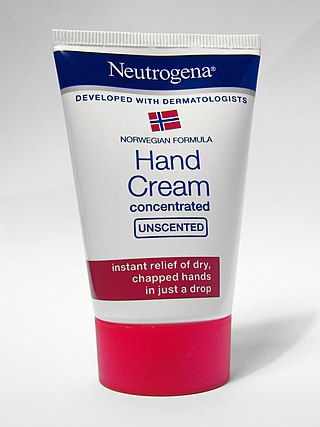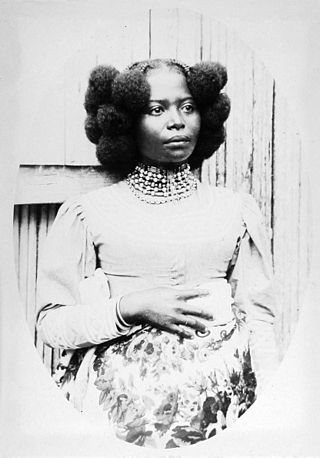
Cosmetics are constituted mixtures of chemical compounds derived from either natural sources, or synthetically created ones. Cosmetics have various purposes. Those designed for personal care and skin care can be used to cleanse or protect the body or skin. Cosmetics designed to enhance or alter one's appearance (makeup) can be used to conceal blemishes, enhance one's natural features, add color to a person's face, or change the appearance of the face entirely to resemble a different person, creature or object. Due to the harsh ingredients in makeup products, individuals with acne-prone skin are more likely to suffer from breakouts. Cosmetics can also be designed to add fragrance to the body.
Revlon, Inc. is an American multinational company dealing in cosmetics, skin care, perfume, and personal care. The headquarters of Revlon was established in New York City on March 1, 1932, where it remains. Revlon was founded by brothers Charles and Joseph Revson, and chemist Charles Lachman. Revlon products are sold in 150 countries and the company has many global locations including Mexico City, London, Paris, Hong Kong, Indonesia, Sydney, Singapore, and Tokyo.

Alvin Ailey Jr. was an American dancer, director, choreographer, and activist who founded the Alvin Ailey American Dance Theater (AAADT). He created AAADT and its affiliated Alvin Ailey American Dance Center as havens for nurturing Black artists and expressing the universality of the African-American experience through dance.

The Estée Lauder Companies Inc. is an American multinational cosmetics company, a manufacturer and marketer of makeup, skincare, perfume, and hair care products, based in Midtown Manhattan, New York City. It is the second largest cosmetics company in the world after L'Oréal. The company owns a diverse portfolio of brands, including La Mer, Jo Malone London, Clinique and Tom Ford Beauty, among many more, distributed internationally through both digital commerce and retail channels.

Neutrogena Corporation, trading as Neutrogena, is an American company that produces cosmetics, skin care and hair care and owned by parent company Kenvue and is headquartered in Los Angeles, California. According to product advertising at their website, Neutrogena products are distributed in more than 70 countries.
Philips Norelco is the American brand name for electric shavers and other personal care products made by the Consumer Lifestyle division of Philips.

Johnson Publishing Company, Inc. (JPC) was an American publishing company founded in November 1942 by African-American businessman John H. Johnson. It was headquartered in Chicago, Illinois. JPC was privately held and run by Johnson until his death in 2005. His publications "forever changed the popular representation of African Americans." The writing portrayed African Americans as they saw themselves and its photojournalism made history. Led by its flagship publication, Ebony, Johnson Publishing was at one time the largest African-American-owned publishing firm in the United States. JPC also published Jet, a weekly news magazine, from November 1951 until June 2014, when it became digital only. In the 1980s, the company branched into film and television.
Black is beautiful is a cultural movement that was started in the United States in the 1960s by African Americans. It later spread beyond the United States, most prominently in the writings of the Black Consciousness Movement of Steve Biko in South Africa. Black is beautiful got its roots from the Négritude movement of the 1930s. Negritude argued for the importance of a Pan-African racial identity among people of African descent worldwide.

The history of cosmetics spans at least 7,000 years and is present in almost every society on earth. Cosmetic body art is argued to have been the earliest form of a ritual in human culture. The evidence for this comes in the form of utilised red mineral pigments including crayons associated with the emergence of Homo sapiens in Africa. Cosmetics are mentioned in the Old Testament—2 Kings 9:30 where Jezebel painted her eyelids—approximately 840 BC—and the book of Esther describes various beauty treatments as well.

Kinky hair, also known as afro-textured hair, is a human hair texture prevalent in the indigenous populations of many regions with hot climates, mainly sub-Saharan Africa, Melanesia, and Australia. Each strand of this hair type grows in a tiny, angle-like helix shape. The overall effect is such that, contrasted with straight hair, wavy hair, or curly hair, kinky hair appears denser.
Admiral is an American appliance brand that is currently marketed by Whirlpool Corporation and sold exclusively at The Home Depot.
George Ellis Johnson Sr. is an American businessman and entrepreneur. Johnson is the founder of Johnson Products Company, an international cosmetics empire headquartered in Chicago, Illinois which created products such as Ultra Sheen and Afro Sheen.

Kara Young is an American model and entrepreneur. As a model she represented several cosmetics companies and appeared three times on the cover of Vogue, Playboy (Germany) and was an entertainment news correspondent for Fox News Channel, as well as co-founding a hair product company and salon.

African-American hair or Black hair refers to hair types, textures, and styles that are linked to African-American culture, often drawing inspiration from African hair culture. It plays a major role in the identity and politics of Black culture in the United States and across the diaspora. African-American hair often has a kinky hairy texture, appearing tightly coiled and packed. Black hair has a complex history, culture, and cultural impact, including its relationship with racism.

Ebony Fashion Fair was an annual fashion event created by Eunice Johnson, co–founder of the Chicago, Illinois–based Johnson Publishing Company. The show ran across the United States and other countries from 1958 until 2009. In addition to the fashion fair, the company also created a cosmetic line named Fashion Fair Cosmetics, in 1973. As of 2017, Fashion Fair Cosmetics are still available for purchase.
The natural hair movement is a movement which aims to encourage people of African descent to embrace their natural, afro-textured hair; especially in the workplace. It originated in the United States during the 1960s, and resurged in popularity in the 2000s.
Joya Powell, also known as Joya Powell-Goldstein, is a Bessie Award-winning choreographer, educator, and activist. As the founding artistic director of Movement of the People Dance Company, she is known for creating politically scorching dance-theatre that confronts issues of race and justice.
YSB, an acronym for Young Sisters and Brothers, was an African American monthly lifestyle magazine, in print publication from 1991 until 1996. The magazine was founded by Robert L. Johnson as a subsidiary of BET. It was the first national African American lifestyle magazine specifically for teenagers age 13 to 19. It was designed to build teenagers self-esteem, and marketed for the "hip-hop generation".
Trouble in Mind is a play by Alice Childress, which debuted Off-Broadway at the Greenwich Mews Theatre in 1955. It premiered on Broadway at Roundabout Theatre Company's American Airlines Theatre on November 18, 2021. The play focuses on racism and sexism in American theatre. It was published in the anthologies Black Theater: a 20th Century Collection of the Work of its Best Playwrights, the second edition of Black Drama in America: an Anthology, Plays by American Women: 1930-1960, and Alice Childress: Selected Plays. It was first published on its own by Theatre Communications Group in 2022.
Willie Lee Morrow was an American barber, businessman and inventor, who worked in the African American haircare industry. He was noted for inventing the Afro pick and developing the forerunner to the Jheri curl hairstyle.










